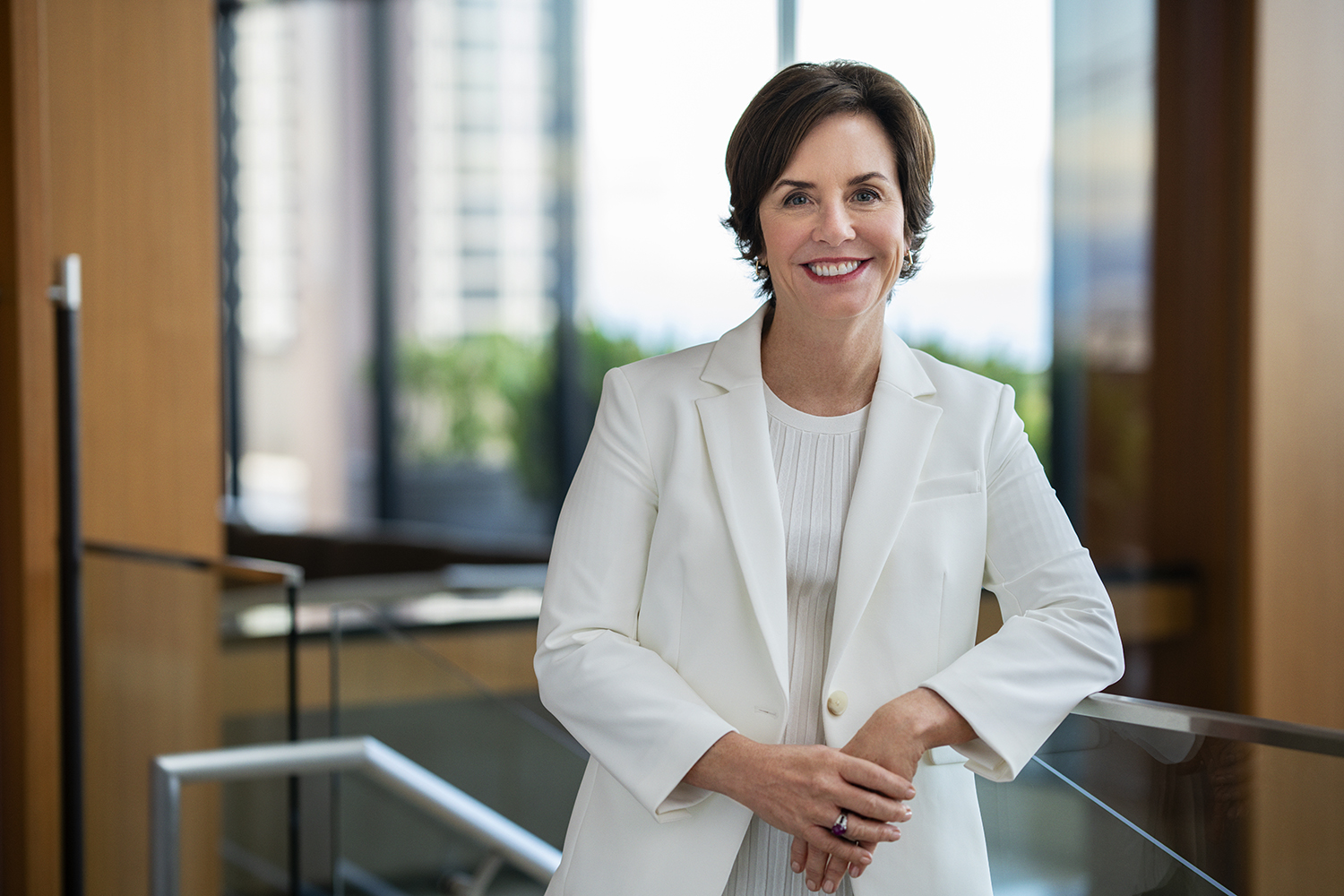A Talk With Carrie Schwab-Pomerantz
Investing is the key to building a nest egg that will last a long lifetime, says Schwab-Pomerantz.


Profit and prosper with the best of Kiplinger's advice on investing, taxes, retirement, personal finance and much more. Delivered daily. Enter your email in the box and click Sign Me Up.
You are now subscribed
Your newsletter sign-up was successful
Want to add more newsletters?

Delivered daily
Kiplinger Today
Profit and prosper with the best of Kiplinger's advice on investing, taxes, retirement, personal finance and much more delivered daily. Smart money moves start here.

Sent five days a week
Kiplinger A Step Ahead
Get practical help to make better financial decisions in your everyday life, from spending to savings on top deals.

Delivered daily
Kiplinger Closing Bell
Get today's biggest financial and investing headlines delivered to your inbox every day the U.S. stock market is open.

Sent twice a week
Kiplinger Adviser Intel
Financial pros across the country share best practices and fresh tactics to preserve and grow your wealth.

Delivered weekly
Kiplinger Tax Tips
Trim your federal and state tax bills with practical tax-planning and tax-cutting strategies.

Sent twice a week
Kiplinger Retirement Tips
Your twice-a-week guide to planning and enjoying a financially secure and richly rewarding retirement

Sent bimonthly.
Kiplinger Adviser Angle
Insights for advisers, wealth managers and other financial professionals.

Sent twice a week
Kiplinger Investing Weekly
Your twice-a-week roundup of promising stocks, funds, companies and industries you should consider, ones you should avoid, and why.

Sent weekly for six weeks
Kiplinger Invest for Retirement
Your step-by-step six-part series on how to invest for retirement, from devising a successful strategy to exactly which investments to choose.
Carrie Schwab-Pomerantz, the daughter of Charles Schwab, is board chair and president of the Charles Schwab Foundation; senior vice president of Charles Schwab & Co.; and board chair of Schwab Charitable, a donor-advised fund. She is also author of The Charles Schwab Guide to Finances After Fifty. She and I recently spoke about retirement-planning advice for women.
Do women face special circumstances when it comes to retirement planning? As you know, women tend to live longer than men, and they move in and out of the workforce to care for children and parents. So they tend to have less money saved for a longer retirement.
How can they overcome their disadvantages? The key is to have an investment strategy. It’s important for we women in particular to educate ourselves about investing and be engaged starting at a young age.
From just $107.88 $24.99 for Kiplinger Personal Finance
Become a smarter, better informed investor. Subscribe from just $107.88 $24.99, plus get up to 4 Special Issues

Sign up for Kiplinger’s Free Newsletters
Profit and prosper with the best of expert advice on investing, taxes, retirement, personal finance and more - straight to your e-mail.
Profit and prosper with the best of expert advice - straight to your e-mail.
Do you think that’s happening? In 2018, Schwab surveyed young people between the ages of 16 and 25. We found that young women were doing all the right things. They were more driven than young men to achieve financial independence, and they see more value than men in creating a plan to achieve their goals. But on average, they had saved 40% less than young men. Also, twice as many young men versus young women had investment accounts, and twice as many men as women say they would invest spare cash.
What’s the solution? As parents, we have to step up and make sure our children—especially girls—are exposed to the financial world and investing. Our studies show that when it comes to money, parents talk differently to their sons and daughters. To their daughters, they emphasize saving and budgeting. With their sons, they are more likely to talk about investing and estate planning.
You are the mother of three young adults, two sons and a daughter. How did you educate them about investing? When they were about 13 years old, I had them come to Schwab and open a custodial investment account with money from their savings. When they were 16 and had earnings from a job, they opened Roth IRAs. It took me longer to get my daughter interested than my sons. She asked me if I would open the account for her, but I said no. It’s important to expose young people to the experience and demystify it.
Were you successful? Now they are all savers and investors, and they feel very comfortable with it. My daughter is 24, and her friends are asking me for help. They’re saving 10% and think they’re saving for retirement, but they forget the investing part. That’s where wealth is created, not just by putting money into a savings account.
Any other advice for women? Use all the retirement-savings vehicles that are available to you. That means 401(k)-type plans if you have one at work, IRAs, or spousal IRAs if you’re not in the workforce but your spouse is. If you decide to drop out of the workforce or cut back, you don’t want it to hurt you in the long run.
How has COVID impacted women’s retirement prospects? Women have been affected more than men because they often have service jobs or dropped out to take on child care responsibilities. For many people, this has been a wake-up call to make a plan (see Financial Planning and Investing: Women Closing the Confidence Gap). It doesn’t have to be super comprehensive, just taking steps to understand what you own, what you owe, your budget and cash flow. If you’re married or in a relationship, you should be involved in all financial decisions. That’s a matter of self-respect. And don’t be afraid to get help from an expert. There’s no such thing as a dumb question.
Profit and prosper with the best of Kiplinger's advice on investing, taxes, retirement, personal finance and much more. Delivered daily. Enter your email in the box and click Sign Me Up.

Janet Bodnar is editor-at-large of Kiplinger's Personal Finance, a position she assumed after retiring as editor of the magazine after eight years at the helm. She is a nationally recognized expert on the subjects of women and money, children's and family finances, and financial literacy. She is the author of two books, Money Smart Women and Raising Money Smart Kids. As editor-at-large, she writes two popular columns for Kiplinger, "Money Smart Women" and "Living in Retirement." Bodnar is a graduate of St. Bonaventure University and is a member of its Board of Trustees. She received her master's degree from Columbia University, where she was also a Knight-Bagehot Fellow in Business and Economics Journalism.
-
 The New Reality for Entertainment
The New Reality for EntertainmentThe Kiplinger Letter The entertainment industry is shifting as movie and TV companies face fierce competition, fight for attention and cope with artificial intelligence.
-
 Stocks Sink With Alphabet, Bitcoin: Stock Market Today
Stocks Sink With Alphabet, Bitcoin: Stock Market TodayA dismal round of jobs data did little to lift sentiment on Thursday.
-
 Betting on Super Bowl 2026? New IRS Tax Changes Could Cost You
Betting on Super Bowl 2026? New IRS Tax Changes Could Cost YouTaxable Income When Super Bowl LX hype fades, some fans may be surprised to learn that sports betting tax rules have shifted.
-
 How Women Can Turn a Gray Divorce Into a Financial Win
How Women Can Turn a Gray Divorce Into a Financial WinGetting divorced later in life can be a big financial blow, especially for women. But, as this financial adviser points out, it can also serve as a positive turning point for growth and independence.
-
 How to Search For Foreclosures Near You: Best Websites for Listings
How to Search For Foreclosures Near You: Best Websites for ListingsMaking Your Money Last Searching for a foreclosed home? These top-rated foreclosure websites — including free, paid and government options — can help you find listings near you.
-
 How Direct Indexing Could Work for You
How Direct Indexing Could Work for YouTax efficiency is the primary goal for many new direct indexing offerings, but they come with a lot of caveats.
-
 They Lost a Spouse but Bounced Back: 5 Women’s Financial Stories
They Lost a Spouse but Bounced Back: 5 Women’s Financial StoriesWomen & Money A look at how five widows got their financial lives in order and got to a better, brighter, more empowered place. They did it, and so can you.
-
 Creating a Values-Based Financial Plan
Creating a Values-Based Financial Planpersonal finance More savers and spenders are thinking big picture when it comes to their financial decisions.
-
 How to Invest $1,000: Open a Robo-Adviser Account
How to Invest $1,000: Open a Robo-Adviser AccountSmart Buying It's easier than ever to access low-cost, automated investing advice through a robo-adviser.
-
 How to Invest $1,000: Buy Fractional Shares (of Great Companies)
How to Invest $1,000: Buy Fractional Shares (of Great Companies)Smart Buying If a single share of a pricey stock seems out of reach, programs from Schwab, Fidelity and Robinhood can get you access to just a slice.
-
 Protect Your Retirement Income from Inflation
Protect Your Retirement Income from InflationMaking Your Money Last With a new President promising tariffs on imported goods from China, Mexico and Canada, inflation may rise in 2025, but that doesn’t have to jeopardize your long-term security.